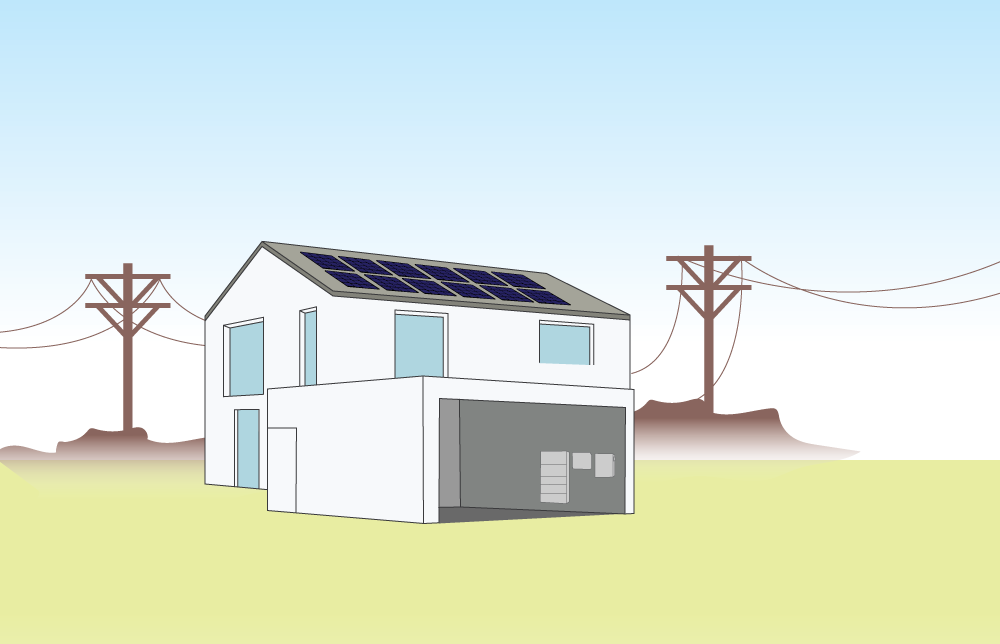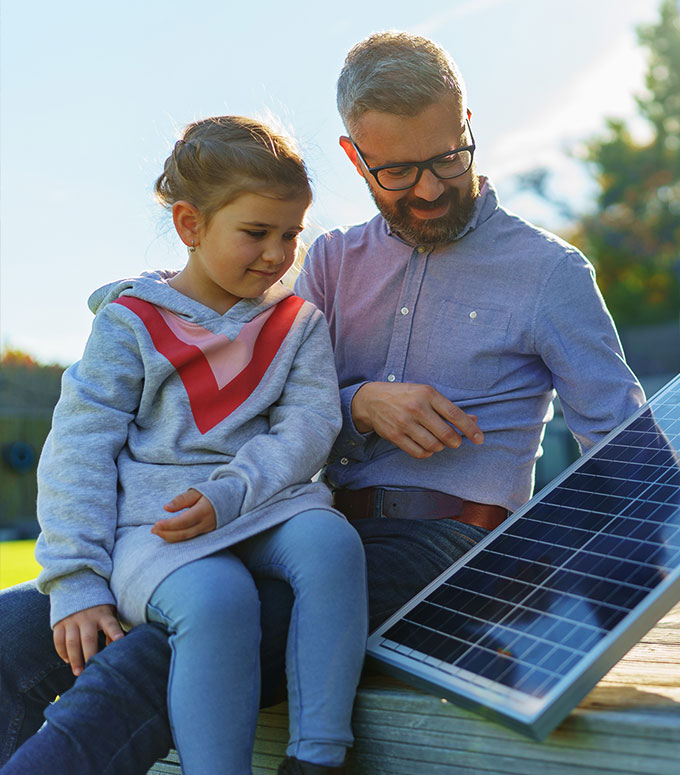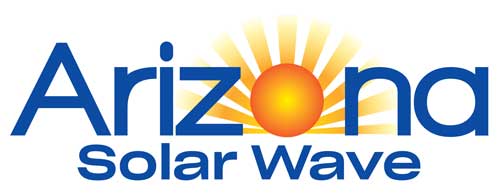Solar 101 – How Solar Works
When sunlight is abundant, electricity flows from the solar panels through wires to a device known as an “inverter.” This inverter transforms the direct current (DC) electricity generated by the panels into the type of power utilized in your house, known as Alternating Current (AC). Once the inverter completes this conversion, the electricity is directed through a dedicated wire to your home’s electrical panel. Subsequently, any surplus electricity produced by your solar panels is channeled back through the power lines and into the utility company’s power grid.

Did You Know?
Is My House A Good Candidate For Solar?
For optimal efficiency in solar energy systems in Arizona, it is recommended that solar panels be oriented to face south. While east and west-facing roofs may receive less direct sunlight compared to south-facing ones, they often still receive sufficient sunlight to generate all the necessary electricity for your home. Homes with panels facing east or west typically achieve about 80% of the efficiency of those with south-facing panels. Even if the alignment is not perfect, adding a few extra panels can often compensate for this and still yield significant savings.
For solar panels to function effectively, it is crucial for sunlight to reach them. If your house’s roof receives ample direct sunlight throughout the day, you might be an excellent candidate for solar energy. However, even if your roof is shaded or obstructed, it doesn’t necessarily rule out the possibility of going solar. Various solutions exist to address the challenges posed by shade.
The performance of a solar energy system can be enhanced through the use of power optimizers or microinverters. These technologies enable individual panels to operate independently, ensuring maximum electricity production when exposed to sunlight. When one panel is shaded, its output may decrease, but the rest of the system remains unaffected. This proves particularly effective in mitigating the impact of tall trees in a neighboring yard.
- Does it get a good amount of direct sunlight (not overly obstructed by shade)?
- What is the orientation of the roof (technically “Azimuth,” but means North, South, East, West)?
- Roof condition, shape, and size.
Arizona Solar Wave is here to help! Our team can typically install a Level 2 charger in as little as 7-business days.
Yes, most residential EV chargers are water and dust resistant and designed to be installed and work outdoors.
Depends on type of installation, where the charger will be installed, if an MSP upgrade is needed. Our team of dedicated solar consultants are here to help you with a custom quote.
Level 1 (regular plug) 2-5 MPH and Level 2 approximately 20 – 60 MPH. To learn more visit our How It Works section.
Up to you – hardwiring typically allows for most amperage therefore fastest charging.
Your team at Arizona Solar Wave will take care of everything for you. From upgrades to permitting. To get started on your custom charger quote please contact us here.
During the virtual consultation, our engineers will need to see a picture of your main service panel, a picture of where you would like the charger, and what’s between them to get started.
Arizona Solar Wave handles everything from installation to permitting so you have nothing to worry about. Our team are experts in all things solar + EV.
It depends. Typically Arizona Wave will only provide service on systems we installed, however, for customers who wish to upgrade their existing system or require re-roofing or removal / repair with an upgrade, we’re happy to to help. Go to our repair service page and fill out your details.
Typical, residential systems take from 2 to 5 days to install. Systems mounted on the ground and systems with batteries are more complex, and may take longer. Most of this time is spent outside of your house, so there is little disturbance to you. Commercial systems take several weeks to over a month to install, depending upon size and type of installation.
Energy conservation and renewable generation adds value to your home. Surveys have shown that for every $1,000.00 saved per year, $20,000.00 is added to a home’s value*. Solar energy can be one of the best home improvement investments you make.
* Newscenter resource link & Zillow resource link
There are many incentives for purchasing solar. These vary from state-to-state. Some common incentives include:
- Lower or fixed utility costs
- Better for our environment, less carbon emissions
- Little or no maintenance
- Solar equipment is more durable and last longer than traditional equipment
- Create secure and backup source for electricity supply
- Now is the time to Go Green
- Remote site with no electric service
- Sending electricity back to the grid (net metering) can generate money
- Higher resale value for your property*
- Most individual states and the federal government have incentives** and rebates to decrease the up front cost of solar energy producing systems. Please contact us for more details.
* Newscenter resource link & Zillow resource link **Please consult your tax adviser regarding your individual tax situation and income tax credit eligibility.
We have installed solar on office buildings, retail buildings, schools, and government facilities. Anywhere electricity is used can use solar electricity.
Most of our customers do not clean their panels. In most areas of the country, there will be sufficient rain to clean the panels. However, if you are in a dusty area (near a busy dirt road, a very urban area, etc…) you may see a performance boost from cleaning the panels monthly. If necessary, a hose stream is usually sufficient for cleaning. Do not walk on or over the panels to clean them. Do not use metal, hard, or abrasive methods for cleaning. Do not spray water on the panels when they are very hot.
PV panels should be installed in areas where they get significant shade-free sun every day. Even small amounts of shade can significantly reduce the output. Our designs and installations also seek to minimize the impact of any shade issues through selection of the proper equipment and good engineering.
Solar panels will last many years, (over 25). Because of this, we want the roof to be in decent condition, as it does not make sense to remove and reinstall the panels after only a few years. However, after the panels are in place, they will greatly reduce the wear on the roof by blocking ultraviolet rays, keeping most snow and ice off the roof, and keeping anything from hitting the roof. Most installations do not require a new roof prior to PV installation.
All of our PV panels are engineered to meet or exceed Florida Building Code Specifications for wind load. In short, the solar panels may help to keep the roof from blowing off during high winds.
In a Clean Power, non-battery system, power is not stored. It is either used immediately in the house, or sent backwards through the meter, creating a credit. If storage is needed, large batteries and other equipment are added to the system.
Net Metering is the regulatory ability to get credit for electricity you generate with solar energy and send backwards through your utility meter. Exact provisions vary with each state, but the effect is to allow you to generate excess power during the day, and use it at night, without needing batteries.
Batteries are only required if you want backup power when the utility is out of service. Without batteries, the system has no way to store power, and for safety reasons cannot produce power without the utility in operation.
Most systems we sell are “clean power” systems, without batteries. These systems do not generate power when the utility is out, even if it is sunny. If backup power is desired, a battery system can be added. This increases the complexity and cost. Most people find that what they want is Clean Power, and find that the very occasional outage does not bother them, so they do not purchase the battery option.
The solar panels have a 25 year power warranty from the manufacturer. This is longer than almost anything else you can buy. Inverters can have warranties up to 10 years. With Arizona Solar Wave you also get the added security of a 25 year workman ship warranty covering everything from labor, shipping to roof top penetrations!
Systems come in all sizes, and produce as much or as little power as required. Many systems produce a portion of the home’s required power, leaving room for additional conservation or generation in the future.
Each home is different, and the amount of electricity you use is very dependent upon your lifestyle, how your home was built, and your appliances. As part of our services, we work with you to reduce your electrical consumption in easy ways.
No. While the panels are made of tempered glass, they are quite strong. Installed PV panels are designed to withstand hurricane force winds, and pass severe weather tests such as hail. Solar equipment is regularly installed in areas with these types of conditions.
South is best, but panels installed facing east or west still can generate a very high percentage of possible power. It is usually more effective (and more attractive) to install the panels in the same plane as the roof direction, rather than build an awkward mount to angle them.
Panels are often mounted on the roof, but can also be mounted on the ground. Ground mounts are great if the house is shaded, or if dormers or other obstructions limit available space on the roof.
A typical system requires about seven to eight square feet for each dollar of your electric bill. This figure varies depending upon your electric rates.
PV stands for Photovoltaic, which in short, is the technical term of converting the sun’s natural energy into electricity using solar panels which are made up of solar or photovoltaic cells. A solar electric system is also called a PV system.





